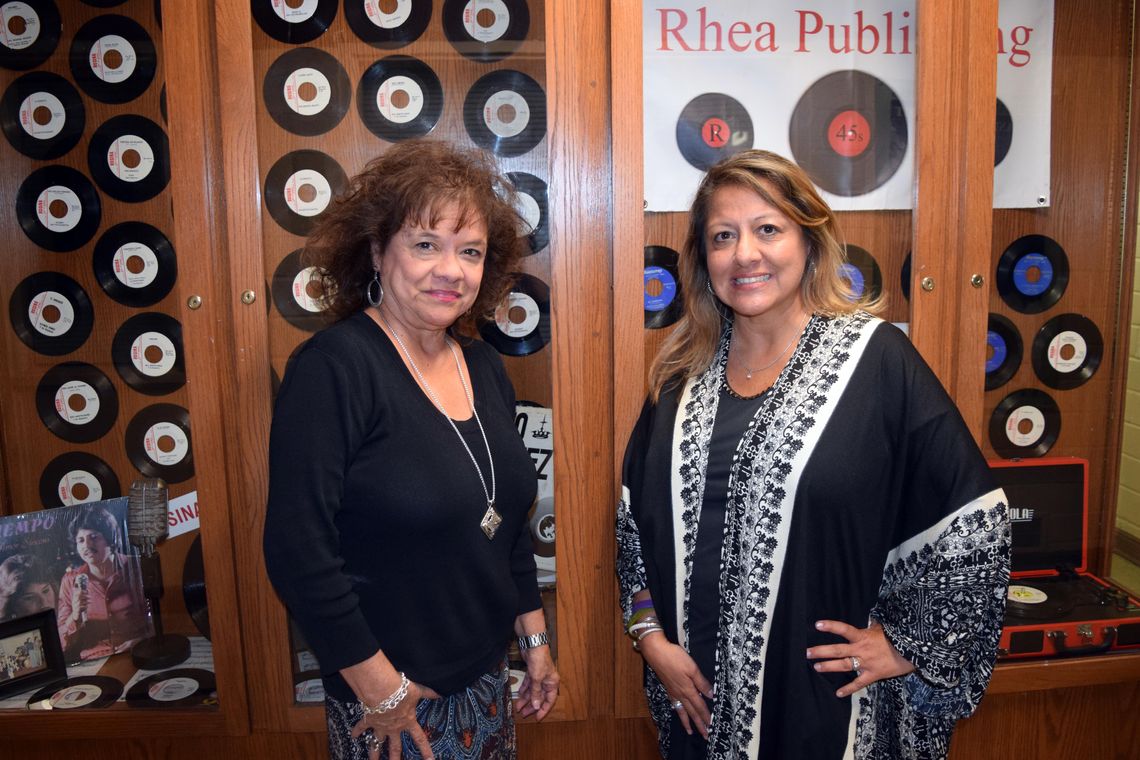In the 1960s, 70s and early 80s, Rosina Records was an independently-owned record label based in San Marcos. Its catalog included Chicano Soul and early recordings of Tejano music legends. Now, decades after owner of Rosina Records, Ruben Ruiz Sr., closed its doors, his daughter Rhea Kimbell is working to resurrect its legacy.
In 2012, Kimbell’s mother’s health started to deteriorate, so she started spending more time at her childhood home. As she started sorting through her parent’s belongings, she ventured into the storage room, where her mother had kept the remaining inventory from her father’s record company.
Being the youngest of seven, Kimbell had always known about the political side of her father. He was San Marcos’ first Hispanic city council member and went on to become Hays County’s first Hispanic county commissioner for Precinct 1. He was also instrumental in helping fight the “poll tax,” that kept many Hispanic voters from being able to register to vote.
Kimbell also always knew that music was important to her family. Her father was a DJ on local radio station KCNY, known as “El Jefe,” and he often hosted concerts and dances in the area that the entrance fee of $1.75 paid for the person’s poll tax. But she never knew the impact of her father's music career.
“Growing up, I always heard about his political side, I kind of always wondered what these records were all about, but I didn't realize the impact until about 7 years ago, when mom's health failed and I was spending more of my time at her home,” Kimbell said. “Just being there, I started picking up stuff and going through it and researching it and found out he had a 20 year career in music. He actually started a lot of artists that are now known as legends of Tejano.”
Ruiz founded Rosina Records and Monterrey Records in 1962. When the label was active, he recorded over 250 songs from over 100 artists early in their careers, many of whom went on to become legends in Tejano like Isidro Lopez, Alfonso Ramos, Gilbert Rodriguez, Augustin Ramirez and Manuel “Cowboy” Donley. Kimbell said she is still filling in the gaps, and the list of artists is still growing.
Kimbell attributes the collection’s excellent preservation to her mother Lillie Ruiz. When Ruben Ruiz Sr. passed away in 1992, she held onto all 3,000 plus records and made sure that they were stored in a climate controlled area in her home, until she passed away in 2018.
“I feel like my mom is to thank for it,” Kimbell said. “I give the credit all to her that she kept them not in an outside garage, but a storage unit in the house — which I haven't heard of, I don't have one like that in my house. So they're in amazing shape, in excellent condition. They weren't in a flood, they weren't in a in a garage outside so they’re not warped or scratched.”
Amidst the treasure trove of vinyl that Kimbell found, was an unreleased compilation LP that Ruiz had put together of Sixto Sanchez. Once billed as the next Ritchie Valens, Sanchez was the lead singer of The Broken Hearts, a very popular up and coming band from Seguin. Late one night in 1967, while returning from a gig in Abilene, the band was involved in a fatal accident and Sanchez was killed.
After taking some of these items to a record show in Schertz, Kimbell and her husband David decided to introduce a new generation to the legacy of Rosina Records. The first thing they did was, working with Compadresmusic and nonprofit organization Rancho Alegre, digitize and release the unreleased compilation LP of Sixto Sanchez. It is now available on CD and on all digital outlets.

Part of the display highlights the recordings of Sixto Sanchez, who was killed in a car accident in 1967, when his career was taking off.
Now Rosina Records currently has a display up at Centro Cultural Hispano de San Marcos, 211 Lee St. The display has many of the original 45 pressings, as well as photos, business cards and other memorabilia. Ruiz’s children are hoping that people will not only come and see the display, but that they will contribute to it — with stories, photos and recordings.
“What we have found is that we have the 45s and we’ve matched up some stories and photos with those, but there's lots of pictures out there that we don't have and hopefully people will come out and look at the display and be like, ‘Oh, that was my uncle’ or ‘that was my brother’ and then the pictures and stories will start to come out,” Kimbell said.
Centro is open to the public Tuesdays through Fridays from 2-6 p.m. and Saturdays from 10 a.m.- 2 p.m. For more information, call 512-878-0640.










